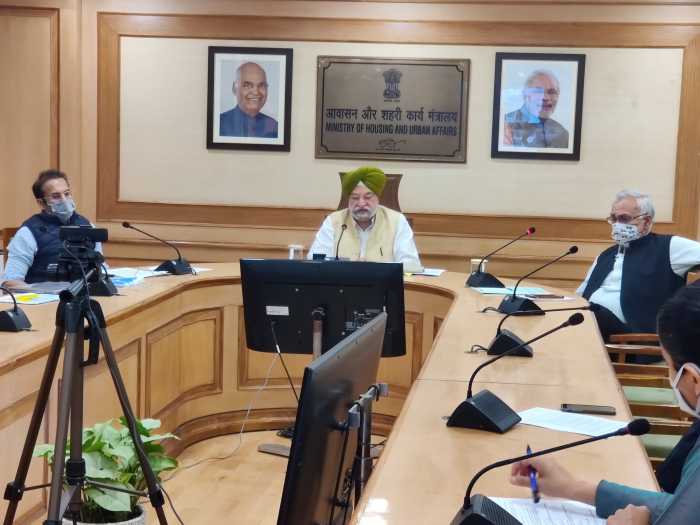
Udaipur : The Smart Cities Mission,Ministry of Housing and Urban Affairs,held a kick-off event for the ‘Nurturing NeighbourhoodsChallenge’ in collaboration withthe Netherlands-based Bernard van Leer Foundation (BvLF) and with the technical support of WRI India.By focusing on the needs of young children aged 0 – 5 years and their caregivers in the public realm, the initiative marks an important step towards making Indian cities sustainable, inclusive, and family-friendly. The programme will support a pan-India challenge, inviting applications from4thNovember 2020.All Smart Cities, capitals of States and UTs, and other cities with population above 5lakhs are eligible to participate.
Under its prime objective of inclusive development, the Government of India is committed to enhancing opportunities in urban areas for all vulnerable citizens, especially young children. The Nurturing NeighbourhoodsChallenge isan open call to Indian cities to propose and pilot neighbourhood-level improvements in public space, mobility, access to services, and data management to enhance the physical and psychological health of young children and their caregivers.
Research shows that investment in the early yearsis critical to help young children thrive and achieve their full potential. The Covid-19 crisis has underscored the importance of neighbourhood-level access to natural green spaces, early childhood services, and opportunities to playforthe healthy development of young children and the wellbeing of their caregivers. By improving the public realm for pregnant women, young children, and their families, cities can nurture stronger communities, economicdevelopment, and healthier environments for everyone.
Through the Nurturing Neighbourhoods Challenge, cities are invited to reimagine parks, gardens, and open spaces for play and interaction; make streets safer for young children; improve access to early childhood services, such asAnganwadisand public health centers;and adapt public spaces with early childhood amenities.Integrated and complementary interventions are encouraged.Improvements undertaken as part of this Challenge willcompound the benefits of recent Ministry initiatives promoting walkable and cycle-friendly cities.
Over the 3-year initiative, selected citiesbased on their proposal, readiness, and commitment – will receive technical support and capacity-building to develop, pilot and scale solutions that enhance the quality of life of young children. Over time, the programme will enable city leaders, managers, staff, engineers, urban planners, and architects to incorporate a focus on early childhood development into the planning and management of Indian cities.
Hardeep Singh Puri, Minister of State (Independent Charge), said: “The urban environment shapes a young child’s health and development, particularly in the crucial and vulnerable first five years of life. During the first 1,000 days of a child’s life, more than 1 million new neural connections are formed every second. By enhancing the primary public domain of young children and their families to be safer and more stimulating for early childhood, the Nurturing Neighbourhoods Challenge can help lay the foundation for more robust social and economic development outcomes in Indian cities for decades to come.” He further added, “Families are challenged by inadequate public transport, as well as food, healthcare and childcare ‘deserts’. Thoughtful urban planning and design can play a major role in addressing such challenges and in giving children a good start in life. This includes Walkable, mixed-use neighbourhoods that cater to the basics a young family needs within 15 minutes on foot; lively, green public spaces close to home that offer amenities for caregivers while allowing small children to explore safely; safe transport routes and transit systems that make it easy, affordable and enjoyable for families with young children to travel; and healthy environments with safe levels of air quality and low noise pollution; and lastly a vibrant community life that supports family well-being.”
Durga Shankar Mishra, Secretary, Ministry of Housing and Urban Affairs (MoHUA) said: “For a city to be responsive to all people, it needs to consciously address the needs of the most vulnerable groups. Incorporating an early childhood lens in city planning will support more holistic, people-oriented urban development.”
Rushda Majeed, India Representative, Bernard van Leer Foundation, said: “We believe that neighbourhoods friendly for infants, toddlers, and their parents and other caregivers is an sustainable and inclusive way to think about cities, with a focus on core infrastructure and better quality of life for its youngest residents, and ultimately all people. A focus on public spaces, mobility, access to services for young children, and other similar aspects supports their health and well-being. Cities that work for very young children are likely to work for all. We are grateful to the Ministry of Housing and Urban Affairsforlaunching this important initiative and look forward to the collaboration with World Resources Institute India and the participating cities.”
WRI India, CEO, Dr. O.P. Agarwal., said: “A people-centric approach needs to be at the centre of urban development discussion in India. Designing cities for young children will ensure that they are safe and comfortable for all. We need to reimagine our cities as places where children can grow in a safe, nurturing and inspirational environment. This would require going back to basic principles of pedestrian-oriented cities by rebuilding streets, public spaces, public transport, access to facilities and utility services, and urban resilience. We are happy to be part of this programme, led by MoHUA and supported by the Bernard van Leer Foundation. We look forward to working with Indian cities to help them implement this vision.”

